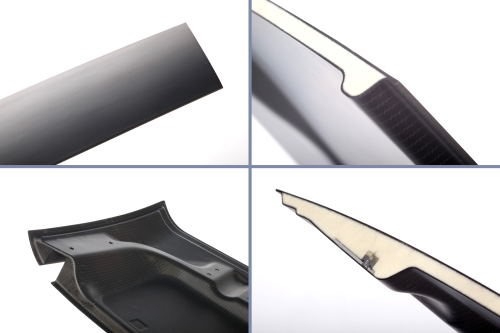
The new Opel Astra OPC, a sports coupé that premiered in March 2012 at the Geneva Motor Show, features a seat pan made from continuous fibre reinforced thermoplastic. The plastics used here are polyamides from BASF’s Ultramid® range.
BASF developed two Ultramid products for the Opel Astra OPC seat pan:
- a non-reinforced grade serves as impregnating material for the glass fibre fabric; and
- an impact-modified short fibre reinforced Ultramid grade is used for overmoulding the preform, creating the required ribs and edges by a classic injection moulding process.
The high strength of the composite laminate allows significantly lower wall thicknesses, reducing the weight of the seat pan by 45%, BASF reports.
RTM roof module study
BASF' Lightweight Composites Team is investigating the potential that three plastic matrix systems – epoxy resin, polyurethane and polyamide – hold for continuous fibre reinforcement in resin injection processes suitable for mass production, including the resin transfer moulding (RTM) process. Target applications are components in car bodies and chassis.
A first demonstrator component for RTM processing is the conceptual study of a multi-segmented convertible roof module in which a polyurethane foam core is sandwiched between carbon fibre reinforced cover layers. The closed-cell structural polyurethane foam branded Elastolit® D forms the core layer of the sandwich and acts as a low bulk density spacer between the cover layers of the laminate, ensuring extremely high component stiffness and providing good insulating properties.
At a total weight of 2.9 kg, the roof segment based on a fibre reinforced composite sandwich concept reduces weight by more than 35% compared to an aluminium structure, and by more than 65% compared to a steel structure.
Further information:





